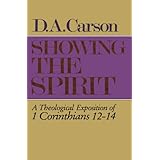
Average Reviews:

(More customer reviews)Are you looking to buy Showing the Spirit: A Theological Exposition of 1 Corinthians, 12-14? Here is the right place to find the great deals. we can offer discounts of up to 90% on Showing the Spirit: A Theological Exposition of 1 Corinthians, 12-14. Check out the link below:
>> Click Here to See Compare Prices and Get the Best Offers
Showing the Spirit: A Theological Exposition of 1 Corinthians, 12-14 ReviewReviewed by Ed Vasicek, Author of The Midrash Key: Pinpointing the Old Testament Texts from Which Jesus PreachedI do not always agree with D.A. Carson (although I mostly do), but I always admire and appreciate him. He is a true scholar who tempers his great mind with a heart for God.
Dr. Carson has written a masterpiece! This volume is an intelligent and definitive grappling with a passage that focuses upon spiritual gifts: I Corinthians 12-14.
He devastates the non-charismatic viewpoint that claims the Bible teaches that tongues would end of themselves upon the completion of the New Testament canon or at the end of the apostolic age. He fortifies (unintentionally) the view of non-charismatics who say, "God can give the gift of tongues today. But we do not see the real thing, so He must not be doing that right now." Although he strains to conclude otherwise, this is where his evidence could easily lead. His actual conclusion is that the gift of tongues is being given today, but not meant for all and not intended to be the believer's focus.
Carson likewise corrects common charismatic abuses by proving the following: (1) every true believer has been baptized in the Spirit, (2) there is no one gift possessed by every believer, but we should seek prophecy over tongues, (3) it is not God's will for all believers to be healed, but God can and does heal miraculously as He pleases.
Carson's exegesis is reasonable, respectful, well-informed, scholarly to the nth degree, clearly delineated and thoroughly documented. Although he addresses the entire text, he particularly focuses upon two of the most controversial spiritual gifts: tongues and prophecy. His views regarding prophecy are about the same as Wayne Grudem's: New Testament prophets do not bear the authority of Old Testament prophets (rather, New Testament authority is vested in the Apostles). Prophecy is God bringing something to mind, and the prophet may mix his own thoughts and thus muddy the prophecy. Unlike OT prophets who were labeled as true of false, in the NT, individual prophecies are to be weighed. There is much to commend this view.
His work on tongues is more exhaustive (but still not complete-see my list of unanswered questions below). He points out that repeated evaluation by linguists have shown that tongues are not human languages. He argues that some legitimate tongues may be coded languages or patterns (for example, a language with its vowels omitted). This is somewhat questionable, though possible (since apparently there has never been a study conducted by expert code-breakers).
What is most fascinating is his conclusion that no verifiable correct interpretations of tongues have been made. Although thorough tests have not been done, Carson mentions a friend who recorded a recitation of a passage in Greek and presented the tape to two individuals claiming the gift of interpretation. They presented interpretations that differed from one another and had nothing to do with the text. He writes, "I know of no major work that has researched hundreds or thousands of examples; but it could be a very revealing study."
But based on this and other similar accounts, we might conclude that if God is not (to the best of our knowledge) truly giving the gift of interpretation, then tongues are not for use in church meetings (where interpretation is demanded). In essence, tongues at this point are limited to private use and personal edification.
Although pensive and thorough, Carson has still left a number of unanswered questions, including: (1) How do the tongues seen in evangelical charismatic assemblies vary from those seen in Hindu, Mormon, or Animistic groupings? (2) Can every human being, saved or not, speak in ecstatic utterances? If so, is this the basis for Biblical tongues (since lost people can often teach and yet we find a New Testament gift of teaching, etc.)? (3) If Christian tongues were not qualitatively different from tongues-speakers in non-Christian religions, then are they really miraculous? (4) Should we allow people to speak in tongues, if interpreted, even though the evidence we do have seems to indicate that the gift of interpretation may not exist in our time or in our country? (5) What about the possibility that some of these gifts are distributed more where the Gospel is being established (as opposed to where the church has been embedded)? Is there evidence to commend or reject this theory? Is it possible that the reportedly high level of miracles in Indonesia is an example of this?
This book is not written at a popular level, but challenges the mind. Pastors and theologians will find it stimulating (and it really is not difficult to understand), but its style, vocabulary, evaluations and refutations may be a stretch for the dedicated laymen.
I love books like this!Showing the Spirit: A Theological Exposition of 1 Corinthians, 12-14 OverviewPartisans on both sides of charismatic issues are challenged by the even-handed consideration of nuances in the Greek text in these three crucial chapters.
Want to learn more information about Showing the Spirit: A Theological Exposition of 1 Corinthians, 12-14?
>> Click Here to See All Customer Reviews & Ratings Now
0 comments:
Post a Comment